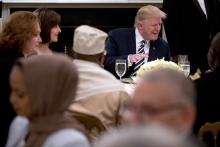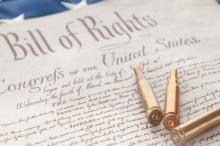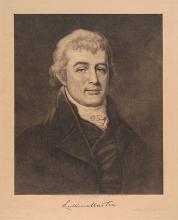founding fathers

I REMEMBER THE EXACT DAY I discovered that some conservative Christians are not all that into democracy. It was 20 years ago. My daughter asked me for help with her social studies homework. I discovered that her Christian school taught a neo-Puritan civics curriculum, which proclaimed that God’s design for human government is rule by “godly Christian men” applying scripture under the sovereignty of God. I was shocked.
In the Trump era, we again witness a conservative Christian flirtation with authoritarianism. These conservative Christians compare Donald Trump to Cyrus of Persia—both authoritarian rulers, both “friendly” to but not part of God’s people, both supposedly used by God—and Trump is lauded as the president of divine providence in shlock films such as Liberty U.’s The Trump Prophecy.
Meanwhile, a quote attributed to Russian Orthodox priest and monarchist St. John of Kronstadt that “in hell there is democracy, in heaven there is a kingdom” is making the rounds on social media, occasioning much comment leaning in the direction of authoritarian rule. John of Kronstadt died in 1908 before the Russian revolution and likely associated democratic tendencies with atheism.

By defining Muslims as future citizens in the 18th century, in conjunction with a resident Jewish minority, Jefferson expanded his “universal” legislative scope to include every one of every faith.

Meaning happens when the purposes of the writer come together with what the reader thinks is important. Since all aspects of any one thing cannot be perceived all at once, we focus our attention on this or that aspect of a thing depending upon what we want to achieve. This is why we can read a particular text many times and find new insights each time. This is also why we cannot agree on what the Second Amendment of the U.S. Constitution means.

As we ponder historian Newt Gingrich's ever more vigorous denunciations of President Obama's "war on religion," it is worth recalling the first time an American politician charged the political powers that be in the U.S. with seeking to "impose a secular vision" on the country (as Mitt Romney put it the other day).
That would be back at the Creation, in Philadelphia in 1787, when an anti-federalist delegate from Maryland named Luther Martin.
"The founders never intended indefinite free speech. They assumed after two weeks any protest would be wiped out by small pox.” — Stephen Colbert
"God helps those who help themselves," is, unfortunately for Mr. Carney, NOT in the Bible.Rather it's an oft-quoted aphorism that sounds like it should be in the Bible but isn't. A "phantom scripture," if you will.
Please keep in your prayers those who are fasting and praying at the U.S. capitol between January 11 to 21, keeping vigil for the closing of the U.S. prison camp at Guantanamo. As an opening to their prayer vigil Wednesday, they engaged in a little prophetic street theater in front of the Justice Department.
In August 2007, candidate Obama promised to close Guantanamo, saying, "As President, I will close Guantanamo, reject the Military Commissions Act and adhere to the Geneva Conventions. Our Constitution and our Uniform Code of Military Justice provide a framework for dealing with the terrorists."
In January 2009, one of President Obama's first official acts was to sign an executive order promising to close Guantanamo within one year. "This is me following through on not just a commitment I made during the campaign, but I think an understanding that dates back to our founding fathers, that we are willing to observe core standards of conduct, not just when it's easy, but also when it's hard," he said.